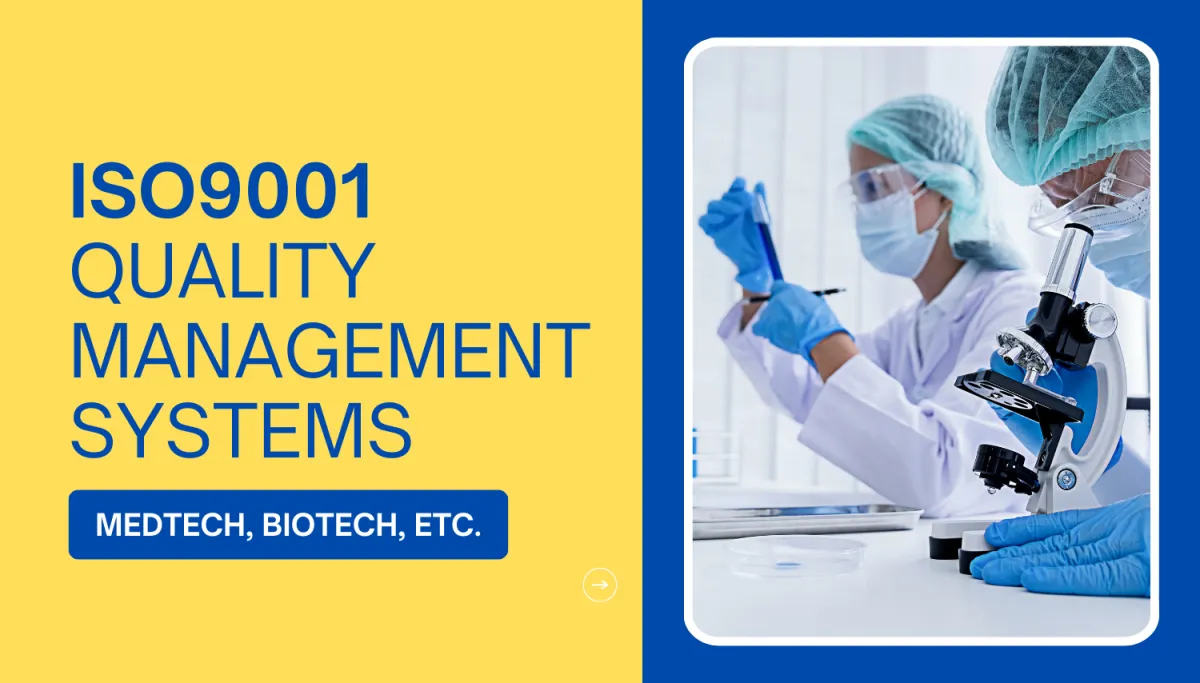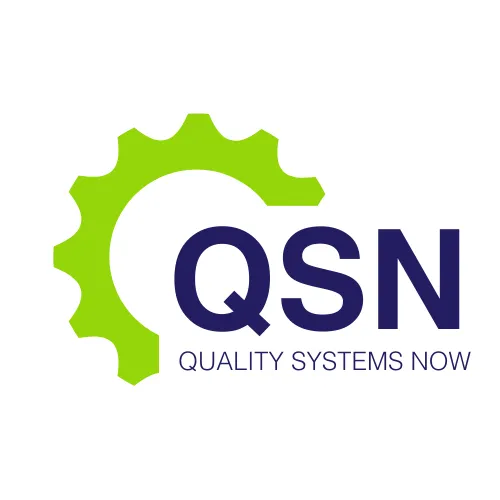LATEST NEWS

ISO9001 - Quality Management Systems (Medtech, Biotech etc.)
ISO 9001 is one of the most widely recognized and implemented quality management standards worldwide. It provides organizations with a framework to ensure their products and services meet customer expectations and regulatory requirements consistently. In sectors like Medtech (medical technology), Biotech (biotechnology), and other related industries, adhering to ISO 9001 standards is crucial for ensuring quality control, process optimization, and regulatory compliance. This article delves into the significance of ISO 9001 for quality management systems (QMS) in the Medtech, Biotech, and similar fields.
At Quality Systems Now we help Australian Business Navigate the complexities of ISO 9001
ISO 9001 is part of the ISO 9000 family of standards, which are focused on quality management. Developed by the International Organization for Standardization (ISO), ISO 9001 sets out the criteria for a quality management system. It helps organizations ensure that they are consistently providing products or services that meet customer and regulatory requirements, while also striving to enhance customer satisfaction.
ISO 9001 is applicable to any organization, regardless of its size or industry. However, for Medtech, Biotech, and other regulated industries, adherence to these standards is particularly vital, given the heightened focus on product safety, efficacy, and compliance with various regulatory bodies such as the FDA (Food and Drug Administration), EMA (European Medicines Agency), and TGA (Therapeutic Goods Administration).
Importance of ISO 9001 for Medtech and Biotech
In sectors like Medtech and Biotech, the stakes are exceptionally high due to the direct impact that products and services have on human health and safety. This makes quality management systems (QMS) a fundamental aspect of business operations. Here’s why ISO 9001 holds immense importance for organizations in these sectors:
1. Regulatory Compliance
Both Medtech and Biotech industries are subject to stringent regulatory oversight due to the critical nature of their products. ISO 9001 serves as a baseline for regulatory compliance by ensuring that the organization’s processes are standardized, auditable, and aligned with required regulations. For example, compliance with ISO 9001 can help companies demonstrate their commitment to meeting the requirements of standards like the EU Medical Device Regulation (MDR) or the US FDA Quality System Regulation (QSR).
ISO 9001 certification can thus streamline the regulatory approval process for new products and services, helping companies meet legal and regulatory requirements while enhancing the chances of timely market entry.
2. Continuous Improvement
A central tenet of ISO 9001 is the emphasis on continuous improvement. The standard promotes a culture where companies are consistently looking for ways to improve their processes, products, and services. In the Medtech and Biotech sectors, where innovation and advancements happen rapidly, continuous improvement is crucial to maintain competitiveness and meet evolving market demands.
By applying the principles of ISO 9001, Medtech and Biotech companies can set up regular reviews of their operations, identify areas for improvement, and take corrective actions to enhance overall quality. This not only helps in product development but also in maintaining high levels of efficiency in manufacturing and service delivery.
3. Risk Management
Managing risk is critical in the Medtech and Biotech industries, where product failure can result in serious consequences, including harm to patients or the environment. ISO 9001 incorporates risk-based thinking, which allows organizations to identify potential risks in their processes, assess their impact, and take preventive actions to mitigate them. This approach is especially valuable in these industries, where maintaining product quality and safety standards is paramount.
By adopting a QMS that aligns with ISO 9001, companies can minimize risks associated with manufacturing defects, supply chain disruptions, and non-compliance with regulatory requirements, thus safeguarding both public health and the organization’s reputation.
4. Customer Satisfaction
ISO 9001 focuses heavily on understanding and meeting customer needs and expectations. In Medtech and Biotech, customer satisfaction isn't just about delivering quality products on time but also ensuring that those products are safe and effective. Adopting ISO 9001 standards ensures that companies can consistently meet customer specifications, improve product reliability, and enhance customer service processes.
Moreover, being ISO 9001-certified offers a competitive advantage, as many customers and healthcare providers specifically look for companies that adhere to recognized quality management standards. This certification provides reassurance that the products meet the highest quality standards and are developed in a controlled environment.
5. Supplier and Partner Relationships
In the Medtech and Biotech industries, organizations often work with a network of suppliers, contractors, and other third-party partners. ISO 9001 can help improve these relationships by ensuring that all parties adhere to similar quality standards. The standard encourages organizations to evaluate and monitor suppliers based on their performance, ensuring that raw materials and services meet the required quality before they are incorporated into the final product.
By collaborating with ISO 9001-certified suppliers, Medtech and Biotech companies can ensure the consistency and quality of the materials and services they receive, which ultimately contributes to the overall quality of the final product.
Key Elements of ISO 9001 in Medtech and Biotech Industries
ISO 9001 outlines several essential principles and clauses that are fundamental to the establishment of an effective QMS. These principles can be broken down into the following categories, which are crucial for Medtech and Biotech companies:
1. Leadership Commitment
Leadership is responsible for ensuring the alignment of the QMS with organizational goals and customer requirements. Senior management must provide clear direction, allocate resources, and foster a culture of quality throughout the organization. In Medtech and Biotech, this commitment is particularly important because leadership must ensure compliance with industry-specific regulations, standards, and customer expectations.
2. Process Approach
A process-based approach is central to ISO 9001, where organizations manage and control their processes effectively to achieve consistent results. In Medtech and Biotech, this means ensuring that every step of product development, from design and manufacturing to testing and distribution, is carefully controlled and monitored to meet quality standards.
3. Risk-Based Thinking
As mentioned earlier, ISO 9001 emphasizes risk-based thinking to anticipate potential challenges and prevent defects before they arise. In Medtech and Biotech, this involves considering potential risks in the development, production, and distribution of medical devices and pharmaceuticals, and creating strategies to mitigate these risks.
4. Documentation and Record Keeping
ISO 9001 requires companies to maintain adequate documentation and records to ensure compliance and traceability. In regulated industries like Medtech and Biotech, where product traceability is crucial for regulatory purposes, adhering to ISO 9001’s documentation requirements ensures that every product’s lifecycle is well-documented and auditable.
Conclusion
ISO 9001 is an essential standard for any Medtech or Biotech company that seeks to establish a robust quality management system. Its principles not only help organizations meet regulatory requirements but also enhance customer satisfaction, ensure continuous improvement, and minimize risks. The integration of ISO 9001 in Medtech and Biotech companies fosters operational excellence, provides a competitive edge, and ensures that organizations can consistently deliver safe and effective products that meet both customer and regulatory expectations. By adhering to ISO 9001 standards, companies in these sectors can build a reputation for quality and compliance, ensuring long-term success in a highly competitive and regulated industry.
